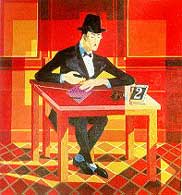
|
|
|
| History of Portuguese Literature | Origins of Portuguese Literature | The Portuguese Language | Oral Literature | Fiction | Lyricism |
| Travel Literature | Cantigas de amigo | Historiography | Doctrinal Prose | ||
| Baroque and Mannerism | Classics | Existentialism | Experimentalism | Enlightenment | Modernity |
| Neo-Realism | Post-Modernism | Realism | Romanticism | Saudosismo | Symbolism |
Classics
|
|
This is a general term referring to sixteenth, seventeenth and
eighteenth-century authors, or to those amongst them who kept themselves
relatively apart from Renaissance humanist (e.g. mannerist and baroque)
principles. It can also be used to refer to nineteenth-century or even later
authors, signifying a consensual recognition of their quality and including them
in the canons accepted at a certain period as forming part of the established
literary convention.
 Portrait of Fernando Pessoa (1964) by Almada Negreiros |
For example, Camões
is regarded as the great classic author of Portuguese literature, although Fernando
Pessoa is also recognised as a “classic author of modernity”.
Generally speaking, the classical doctrine of the sixteenth to the
eighteenth centuries is based on the principle of imitating the authors of
classical antiquity, the treatment of universal human values and both achieving
a balance and distinguishing between the different forms and genres.
© Instituto Camões, 2001